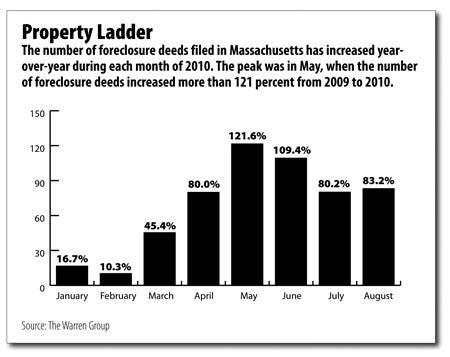Earlier this month, Attorney General Martha Coakley joined a group of 44 other attorneys general to find out whether mortgage servicers have pursued foreclosures based on inaccurate documentation.
She called for a moratorium on foreclosures in Massachusetts among several major lenders until the state could figure out whether those lenders had followed the letter of the law when processing foreclosure documents.
The uncertainty of the situation and the effect a widespread moratorium of foreclosures would have in the market has some in Central Massachusetts a little agitated.
After all, the Massachusetts mortgage market is shared between giants like Bank of America and a very large number of smaller regional and community banks. And the community banks don’t feel they deserve to be swept up with large banks and financial institutions that may have used “robo-signers” and other flimsy means of processing foreclosures.
Putting On The Brakes
Bank of America voluntarily halted foreclosures in 23 states (not Massachusetts). Two other institutions, Ally Bank, which is part of GMAC, and JP Morgan Chase also agreed to stop tens of thousands of foreclosures after documentation problems were discovered.
Coakley sent a letter asking BOA, GMAC/Ally, JP Morgan Chase and Wells Fargo to suspend foreclosures, evictions and sales of foreclosed properties once “information became public showing that they routinely submitted affidavits related to the foreclosure process containing information that was not verified or known by the…agent that signed the affidavit.”
President Barack Obama dismissed the attorneys generals’ idea of a nationwide moratorium on foreclosures, and 10 days after it began, Bank of America’s self-imposed moratorium was off, as were those of GMAC and JP Morgan Chase.
But a group made up of nearly every attorney general in the United States is a force to be reckoned with, and the possibility of a widespread moratorium is not off the table.
“They’ve assured us that they are fixing this problem, but we’re not just going to take their word for it,” a spokesman for Iowa Attorney General Tom Miller told the Wall Street Journal.
Local View
Bankers and economists worry that bringing foreclosures to a halt could have disastrous effects on the state’s economy once the moratorium is lifted.
“It’s like throwing out a net and killing a bunch of dolphins,” said Jon Auger, a senior vice president at Middlesex Savings Bank in Natick.
“There are obviously some large, national lenders that have had issues in this area,” Auger continued. “But there are 200 community banks in Massachusetts and we don’t get to (foreclosure) without going to great lengths to fix the situation. There’s no question about who made the loan and who owes the loan. There’s nothing to be gained from postponing it.”
Philip Pettinelli, president and CEO of Southbridge Savings Bank in Southbridge, said he has the utmost confidence in Southbridge Savings’ documents, and that the foreclosure process is time-consuming and thorough.
The state has a 90-day “right to cure” period during which a lender must allow a borrower time to get back into good standing before foreclosure starts.
“I’m working with borrowers three months before that,” Pettinelli said, “and if we can’t solve the problem, we’ll try to sell (the property).”
Pettinelli said it can take a community bank more than a year to complete a foreclosure. Last year, Southbridge Savings completed between 12 and 15 foreclosures, Pettinelli said.
“I’m not trying to be the mean old bank here, but fair is fair. As much as many folks don’t want to think so, most banks are not nonprofit,” Pettinelli said.
The Floodgates
Stan Humphries, chief economist at real estate tracking firm Zillow.com, said in a recent blog post, “Calls for a moratorium on foreclosures, while politically attractive for elected officials and their regulators, are misguided and would do significant damage to the nascent stabilization in home values.”
Humphries said he believes that that a key reason for why markets in some so-called “non-judicial” foreclosure states like Massachusetts and California seem to be recovering faster than markets in judicial foreclosure states like Florida is that foreclosures are clearing through the market faster without court intervention.
Another prominent economist, Barry Bluestone of Northeastern University in Boston, said he’s worried about the aftermath of a foreclosure moratorium.
How a moratorium would look varies. For example, Richard Blumenthal, Connecticut’s attorney general, called for a 60-day moratorium on all foreclosures.
Coakley’s was more open-ended and focused on the largest lenders.
In either case, “It’s very, very hard to tell what the impact of this will be,” Bluestone said.
After a moratorium is lifted, “you could have just a deluge of foreclosure deeds, putting more foreclosures on the market, dragging prices down and putting more homeowners underwater,” he said.
Moratorium or no, the speculation is having an impact, according to Auger at Middlesex Savings.
“The cumulative effect in the real estate market is that there’s a lot of uncertainty out there,” he said. “Home prices are way down. Rates have never been lower and people are not rushing to buy. This is one more log on that fire.”

